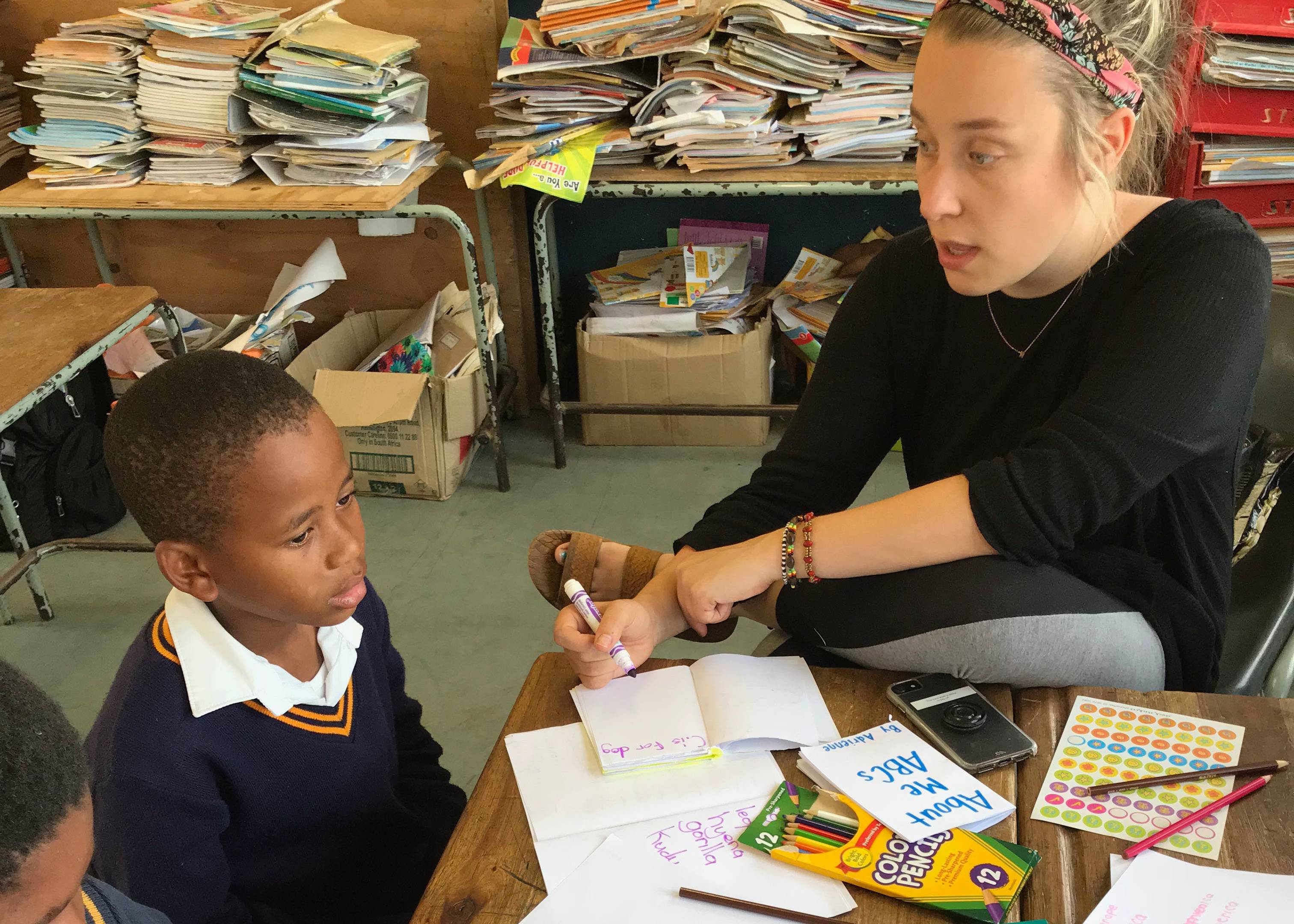Dr. Lori Assaf receives International Research Accelerator grant to improve writing instruction in South Africa
Dr. Lori Assaf receives International Research Accelerator grant to improve writing instruction in South Africa
Emma Carberry | August 9, 2019
Texas State’s International Research Accelerator is an internal funding opportunity that supports faculty projects intended to increase study abroad or research abroad opportunities, impact real-world problems, and have an impact on underrepresented student and/or faculty populations. This year, 37 faculty members campus-wide applied for funding through this opportunity and Dr. Lori Assaf, professor in the Curriculum and Instruction Department, was one of just three applicants who received funding for her project. Her funded project, “Co-Designing Generative Professional Development: Extending Literacy Learning in South Africa” has threefold goals: first, to enhance teachers’ pedagogical practices and knowledge of research-based literacy development and assessment, then to increase students’ reading achievement in the foundation phase and upper primary grades, and finally to design a generative model of professional development that can be replicated for rural schools in other Sub-Saharan countries.

A few years prior to her first developmental leave in 2011, Assaf reached out to colleagues in South Africa about writing instruction and literacy research in the country. She heard from several South African colleagues that there was a need for professional development and research on writing especially in the Eastern Cape. In 2011, Assaf spent her first developmental leave in Cape Town South Africa working with an English high school teacher and colleague at University of Cape Town teaching writing. Later that year, she was invited to co-facilitate the Kwa-Natal Winter Writing Project, a week long writing institute in Durban, a coastal city in the KwaZulu-Natal province. This professional opportunity allowed her to conduct a nine-month ethnography with six of the teachers she worked with in the writing institute. At the same time, Assaf has run an annual study abroad trip to rural South Africa and has been conducting courses and research in the country’s Eastern Cape for the past seven years. "I have worked hard to create trusting relationships with teachers, students and community members” in that time, she shares. These relationships are what ultimately led her to another developmental leave, which she will spend developing a sustained model of professional development in literacy instruction for rural South African schools.
Data from South Africa’s Annual National Assessment (ANA) and the Progress in International Reading Literacy Study (PIRLS) show that South African students have some of the lowest worldwide literacy levels, and that rural students specifically score about 30% in reading and writing, both in their mother tongue and in English. For the purposes of this study, Assaf will be working with teachers at African Angels Independent School in Chintsa, a rural school in the Eastern Cape. She has worked extensively with this school in the past and has established lasting relationships with its faculty and the headmaster, Lou Billett. Assaf’s hope is that her work with African Angels will serve as a pilot study on how to develop a successful professional development model that she can then replicate with other rural communities where underrepresented students are falling behind in literacy learning.
|
"I want the teachers and the community members to have a very loud voice and decision in what we do." -Dr. Lori Assaf |
It is important to Assaf that the anticipated professional development model is co-designed alongside a leadership team of teachers and community members, including parents. “I want the teachers and the community members to have a very loud voice and decision in what we do,” she says, adding that she knows a prescriptive outsider approach will not be effective. Before developing any plans, Assaf will spend two to three weeks with this leadership team, examining the literacy and language instruction issues at hand and formulating the best ways to address them. She will then create a curriculum around those issues that she will implement during the five month-long trips she’ll take over the next year. Though she cannot be sure until she speaks with the team, she imagines this implementation will involve coaching teachers, modeling lesson plans, gathering assessment data, and evaluating that data with the teachers. After implementing the program, she plans to evaluate its effectiveness by revisiting the ANA scores and analyzing teacher interviews and classroom observations.
Additionally, Assaf notes that some teachers in rural South Africa tend to have a deficit perspective of their students, which may influence their instructional methods. She hopes to address this issue by engaging the teachers in a community ethnography, during which they would go into the community and learn about the linguistic and cultural capital of the community. “Through that process, my hope is that there will be a better recognition of the abilities, the network, the knowledge that these parents and communities have that can be used in the schools," she says.


The work Assaf has previously conducted in the Eastern Cape has clearly made an impact not only in the region, but also with the Texas State students who have participated in her study abroad program. Four of these students chose to move to Chintsa at various points in their careers and to work directly with African Angels. These students, Rachel Korngut, Sophie Walker (‘16), Kaylie Woodul (‘17) and Adrienne Burkhart (‘17), have now all returned to Texas and will serve as research supports to Assaf when she is stateside. Assaf also hopes to include current Texas State students in this project during her study abroad program in the summer of 2020, when she will be finishing up her research. Her plan is to bring them on board to implement the course she has designed over the course of the previous year.
Assaf will embark on the first of her trips in late August and is excited not only to reunite with the friends she has made over the years, but also to begin the first stages of improving literacy instruction for children in rural South Africa.